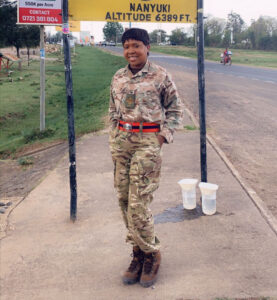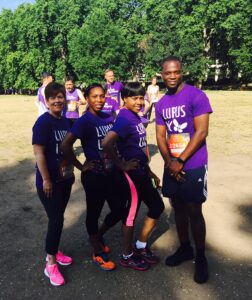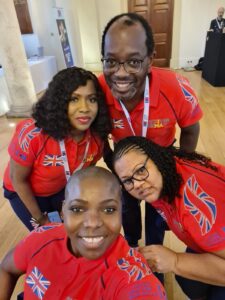
Road to the Invictus Games 2023 – My lupus journey by Claudine Martin
 May 16th, 2023
May 16th, 2023 Nakita Cambow
Nakita Cambow Blog
Blog 0 Comments
0 Comments
 My army career
My army career
I joined the British army in 2006 when my son was just a year old. After 14 weeks of arduous basic training and 8 weeks phase two training, I deployed to Iraq in early 2007. As a young mother, balancing the demands of the army and family life was challenging but I embraced the challenges and enjoyed the perks. One of the many things I love about the army is the need to stay fit and active. I enjoy running charity races and taking part in fitness challenges to bolster my fitness and raise awareness for a good cause. More so, I always look forward to any overseas adventurous training expeditions that can bond us as a team as well as visiting a new country.
Getting diagnosed
What was supposed to be the start of a great year turned out to be a life-changing experience for me. In the new year of 2016, not only was I celebrating the new year, but I was also celebrating a pivotal time in my career… promotion to Sergeant. The celebration was short-lived as I started to experience some unusual symptoms such as night sweat, hair and weight loss, extreme fatigue, joint pain and lack of appetite. A fit and active soldier, I started to fall behind when training with my comrades. This seemed to have carried on for a month so I decided to see the doctor as I could no longer bare the discomfort I was feeling.
Initially, the doctor suspected lymphoma due to the swelling of my lymph nodes and the results of my blood test. Due to that I was referred to a hematologist for follow up and treatment. I had a few appointments with the hematologist who also believed it was stage three lymphoma. This was devasting news and I remember calling my sister in the United States in tears. However, after a biopsy it was proven that I did not have lymphoma, so I was then referred on to a Rheumatologist. In May 2016, I was diagnosed with Systemic Lupus after 6 months of investigation. I was sad to learn that I have to live with an illness for the rest of my life but relieved that I was given a diagnosis.
Lupus and the army
Months after my diagnosis, I accepted the fact that this illness is forever, and I must get on with my life. Family, friends and army colleagues were very supportive and often supported  me with fundraising activities for LUPUS UK. After a year on hydroxychloroquine, my lupus became stable, and I was able to carry on with my military duties such as overseas deployments, training exercises, adventurous expeditions and physical training. I also moved around a few times in different roles and was rewarded with a promotion to Staff Sergeant. In September 2021, I deployed to Kenya on a 6-week training exercise to support the battle group headquarters. As expected, Kenya was hot and humid and within a week I started to flare. I suffered my worst lupus flare which left me with horrific permanent scars and frontal alopecia. I was sent back to the UK because I was too ill to carry out my military duties. After my return, I was put on methotrexate which meant that due to the nature of the drug, I would be unable to deploy overseas on operations or training exercises. Despite these challenges I was still able to complete my bachelor’s degree with the University of Lincoln.
me with fundraising activities for LUPUS UK. After a year on hydroxychloroquine, my lupus became stable, and I was able to carry on with my military duties such as overseas deployments, training exercises, adventurous expeditions and physical training. I also moved around a few times in different roles and was rewarded with a promotion to Staff Sergeant. In September 2021, I deployed to Kenya on a 6-week training exercise to support the battle group headquarters. As expected, Kenya was hot and humid and within a week I started to flare. I suffered my worst lupus flare which left me with horrific permanent scars and frontal alopecia. I was sent back to the UK because I was too ill to carry out my military duties. After my return, I was put on methotrexate which meant that due to the nature of the drug, I would be unable to deploy overseas on operations or training exercises. Despite these challenges I was still able to complete my bachelor’s degree with the University of Lincoln.
In November 2022, the army sent me to a medical board to determine my suitability to continue serving. The decision was made, and I will be medically discharged from the army in May this year. The decision didn’t come as a shock and in all honesty, I was happy with the decision. Another reality to accept; lupus has prematurely ended my army career. So, what is next? The transition from military to civilian life is a huge change and I need the resilience and the motivation to keep me going. So, I thought about a challenge that can inspire and help me with my transition journey. What can I do?… The INVICTUS GAMES 2023!!!!!
 Invictus Games 2023
Invictus Games 2023
The Invictus Games is an international multi-sport event first held in 2014, for wounded, injured and sick servicemen and women, both serving and veterans. The Invictus Games use the power of sport to inspire recovery, support rehabilitation and generate a wider understanding and respect for wounded, injured and sick.
Selection Camp
Some of my military colleagues took part in the last Invictus games and told me how beneficial it will be for my transition. I went on to the Royal British Legion website and registered my interest for the games. A few months later I received an email to apply for the selection camps. I applied straight away and attended three selection camps. The selection camp is the first step in getting selected for Team UK. I met other serving personnel and veterans with similar stories and enjoyed the team bonding sharing our experiences of either been ill or wounded.
Selection for Team UK
After the training camps ended, I received another email to apply to take part in the games. The process involves a one-minute video stating why you should be  selected and 250 words explaining how you would leverage the opportunity. Selection for the team is not about your ability to do your chosen sport but the impact the games will have on your recovery. I applied and waited patiently to find out if I had made the team. One busy day at work I checked my email and saw an email which read “SELECTED”.
selected and 250 words explaining how you would leverage the opportunity. Selection for the team is not about your ability to do your chosen sport but the impact the games will have on your recovery. I applied and waited patiently to find out if I had made the team. One busy day at work I checked my email and saw an email which read “SELECTED”.
I was over the moon and couldn’t contain my excitement. All selected and reserved participants were invited to a three-day team announcement event in London. I beamed with pride when Team UK kit was revealed to us. On the final day, the team was announced to the media and the nation. I am proud to be representing the UK and be an inspiration to family, friends and all the lupus warriors out there. I will be competing in the athletics and am currently training with the hope of winning a medal.



 ©2024 LUPUS UK (Registered charity no. 1200671)
©2024 LUPUS UK (Registered charity no. 1200671)